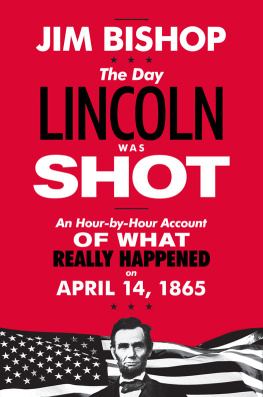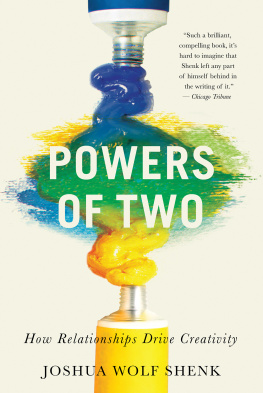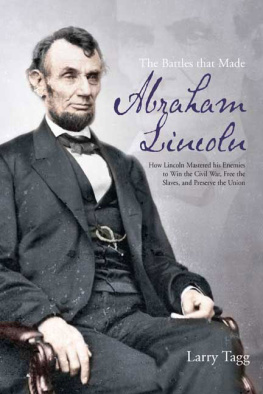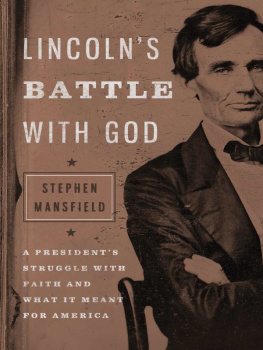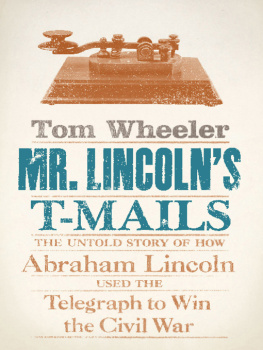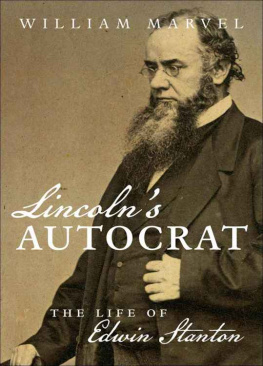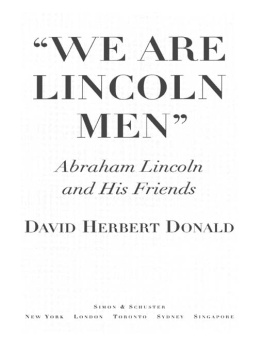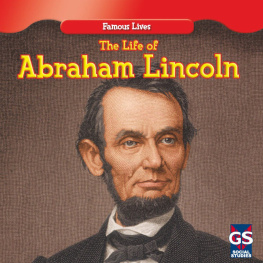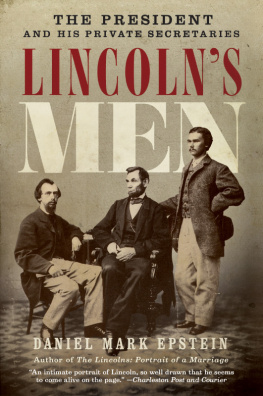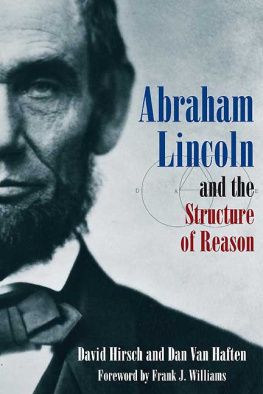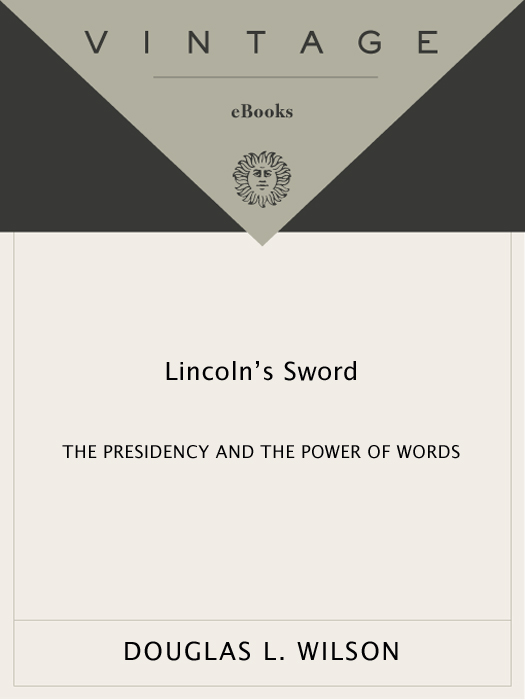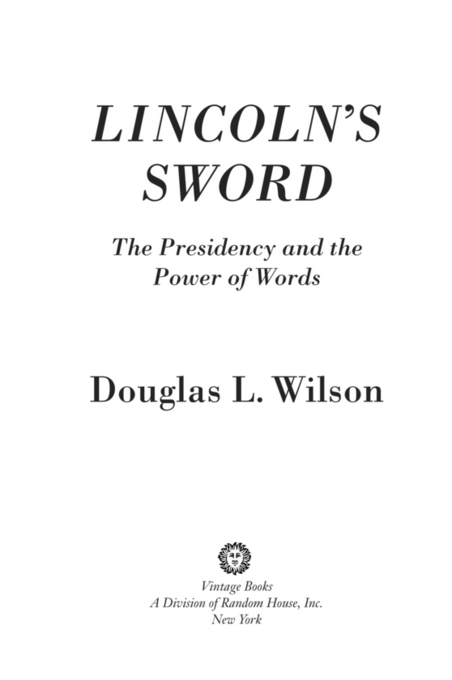Acclaim for Douglas L. Wilsons
LINCOLNS SWORD
A boomlet of books about Lincolns oratory has flooded the market in recent years. All are excellent, but Douglas L. Wilson takes the conversation to an even higher level in Lincolns Sword. Wilson restores the humanity behind the famous face.
Los Angeles Times
In a work of rare forensic skill and illumination, Douglas Wilson exposes the compositional layers of Lincolns key writings to reveal how the Union presidents indefatigable care over words served as an essential element of his political practice and leadership. Lucid, subtle, and persuasive, Lincolns Sword is both a joy to read and scholarship of the very highest order.
Richard Carwardine, author of Lincoln: A Life of Purpose and Power
Paints a vivid picture of Lincolns writing habits. As enjoyable and entertaining as it is enlightening.
The Providence Journal
Lincoln thought best with a pen in his hand. Wilsons quite stunning achievement is to recover Lincolns thought process as it drafted and edited its way to the simple truth that needed to be told.
Joseph J. Ellis, author of His Excellency: George Washington
Wilson makes readers feel as if they were sitting at Lincolns elbow as he writes. A perceptive portrait of Lincoln with pen in hand.
Booklist
Wilson expertly demonstrates just how much Lincoln used his flair for language to influence public opinion. By the time he was assassinated, it was clear that his pen had become as mighty as any sword.
The Washington Post Book World
Swathed in marble and myth, the very human Lincoln is as elusive as the icon is recognizable. It is Doug Wilsons genius to reconstruct the man by deconstructing his words. Persuasive, often surprising, and never dull, Lincolns Sword is wielded memorably by a scholar and historical sleuthat the peak of his powers.
Richard Norton Smith, founding director, Abraham Lincoln Presidential Library and Museum
Will not only cause readers to see Lincoln in fresh ways, but they will discover how disciplined exactness can sharpen their own writingand rewriting.
St. Louis Post-Dispatch
Behind a folksy facade, Lincoln was three thingsa brilliant intellectual, a shrewd politician, and a literary genius. Douglas Wilson shows us how the first two qualities made the third one so effective.
Garry Wills, author of Lincoln at Gettysburg
Wilsons most fascinating achievement in his new book is the glimpse he offers into Lincolns mind.
American Heritage
Enlightening. Enough anecdotes and interesting asides to keep academic and casual reader alike entertained.
Pittsburgh Post-Gazette
This fascinating book is the first close scholarly student of the origins, drafting, writing, rewriting, and polishing of Abraham Lincolns most important presidential papers. Written by a master historian, it is not merely a superb study of Lincolns prose style; it offers fresh insights into the way the president thought and wrote. Every serious student of Abraham Lincolns career will find it indispensable.
David Herbert Donald, author of Lincoln

Douglas L. Wilson
LINCOLNS SWORDDouglas L. Wilson is codirector of the Lincoln Studies Center at Knox College. His previous book, Honors Voice: The Transformation of Abraham Lincoln, was awarded the Lincoln Prize in 1999. He lives in Galesburg, Illinois.
ALSO BY DOUGLAS L. WILSON
Honors Voice: The Transformation of Abraham Lincoln
Lincoln Before Washington: New Perspectives on the Illinois Years
EDITED BY DOUGLAS L. WILSON
Herndons Lincoln
(with Rodney O. Davis)
Jefferson Abroad
(with Lucia Stanton)
Herndons Informants: Letters, Interviews,
and Statements About Abraham Lincoln
(with Rodney O. Davis)
Thomas Jeffersons Library:
A Catalog with the Entries in His Own Order
(with James Gilreath)
Jeffersons Literary Commonplace Book
The Genteel Tradition: Nine Essays by George Santayana
FIRST VINTAGE BOOKS EDITION, OCTOBER 2007
Copyright 2006 by Douglas L. Wilson
All rights reserved. Published in the United States by Vintage Books, a division of Random House, Inc., New York, and in Canada by Random House of Canada Limited, Toronto. Originally published in hardcover in the United States by Alfred A. Knopf, a division of Random House, Inc., New York, in 2006.
Vintage and colophon are registered trademarks of Random House, Inc.
Illustrations and documents appear courtesy of the following: Abraham Lincoln Presidential Library and Museum, Springfield, Illinois; John Hay Library, Brown University, Providence, Rhode Island; Library of Congress, Washington, D.C.; New York State Library, Albany, New York; Special Collections Research Center, Morris Library, Southern Illinois University, Carbondale, Illinois; Wadsworth Atheneum Museum of Art, Gift of Miss Elizabeth Dixon, Hartford, Connecticut.
The Library of Congress has cataloged the Knopf edition as follows:
Wilson, Douglas L.
Lincolns sword : the presidency and the power of words / Douglas L. Wilson.1st ed.
p. cm.
1. Lincoln, Abraham, 18091865Literary art. 2. PresidentsUnited StatesBiography.
3. English language19th centuryStyle. I. Title.
E 457.2. W 74 2006
973.7092dc22 2006045259
[B]
eISBN: 978-0-307-48753-7
Author photograph Peter Bailey
www.vintagebooks.com
v3.1
To Sharon
Contents
Prologue
I N THE FOUR YEARS that Abraham Lincoln would be president, the American public would gradually discover, much to its collective astonishment, that this unprepossessing Illinois politician had remarkable abilities as a writer. In that brief period, and in the midst of a relentless siege of crises and distractions, he would produce not one or two examples of provocative writing (which would itself be more than most presidents could manage) but a whole series of unmistakably impressive documents. Even though confined to such unpromising formats as ceremonial speeches, messages to Congress, proclamations, and public letters in newspapers, Lincolns presidential writing proved to be timely, engaging, consistently lucid, compelling in argument, and most important of all, invested with memorable and even inspiring language. Eventually it began to be recognized that Lincolns unsuspected literary talent was having a decisive effect in shaping public attitudes and was a telling factor in the success of his policies. Only with his death, however, did it begin to dawn on his contemporaries that Abraham Lincolns words were destined to find a permanent place in the American imagination.
All of this came to the American public, and particularly to members of the American intelligentsia, as a revelation. His nomination for the presidency over more familiar and established candidates had been a disappointment to the literati, to say the least. The verdict of Charles Francis Adams, son and grandson of presidents and a leading Republican, was typical: Good natured, kindly, honest, but frivolous and uncertain. The last thing the intellectual establishment looked for from this folksy, self-educated prairie politician was literary ability. Perhaps no point in the career of Abraham Lincoln has excited more surprise or comment, wrote John G. Nicolay, than his remarkable power of literary expression. As Lincolns private secretary and later biographer, Nicolay had witnessed the unfolding of this surprising phenomenon at first hand, a phenomenon that continued to mystify the learned long after Lincolns death. It is a constant puzzle to many men of letters how a person growing up without the advantage of schools and books could have acquired the art which enabled him to write the Gettysburg address and the second inaugural. They could accept that such a man might be an exceptional storyteller or stump speaker, but writingespecially writing of a high orderwas somehow different. For Nicolay, this was not so much a mystery as a fact. The remarkable thing, he wrote, was that while nature and opportunity gave him talent and great success at story-telling and extemporaneous talking, he learned to writelearned to appreciate the value of the pen as an instrument to formulate and record his thought, and the more clearly, forcibly, and elegantly to express it.


